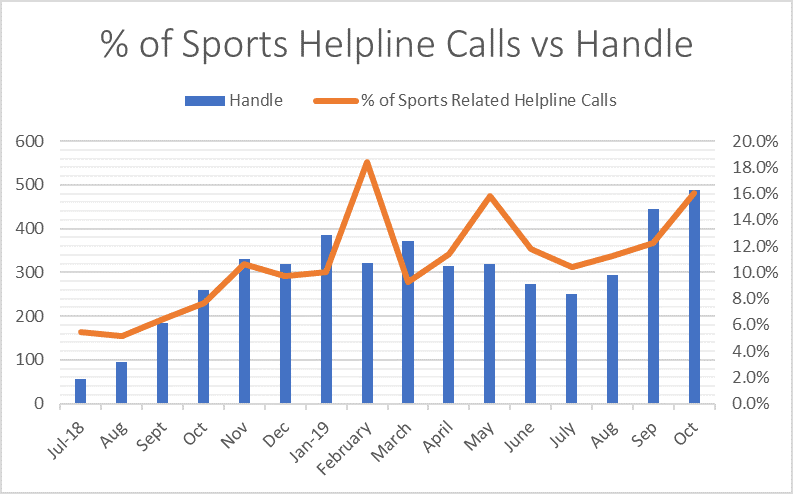An Analysis of the 800GAMBLER Helpline
By
Neva Pryor, MS and Dan Trolaro, MS
A large crowd gathered at the betting window in Monmouth Park, waiting for Governor Murphy to place the first legal sports bet in New Jersey. With the stroke of a pen and the placing of the first bet, sports betting became legal in New Jersey on June 11, 2018. Murphy’s bet was that Germany would win the World Cup, and the New Jersey Devils would take home hockey’s Stanley Cup. By the end of the month, New Jersey would rake in 16.4 million dollars in sports wagers.
According to legalsportsreport.com, in October of 2019, the handle (the amount of money in wagers accepted), was 487.9 million, up 9.5% from September. Approximately $4.7 Billion has been wagered since that historic day according to www.playnj.com/sports-betting/revenue. Over 84% of all wagers in NJ are placed online via mobile device, tablet, or computer via sports betting apps.
Over a year later, callers like Bob, a father from North Jersey with twins, are calling for help because they just cannot stop internet sports betting. There are so many options to choose from coupled with the ease of access, creating a virtual sports book in the gamblers’ pocket 24 hours a day. For some, this can lead to time away from family, financial devastation of and even suicide.
The Council on Compulsive Gambling of New Jersey, Inc. is a private non-profit organization that provides information, education, and referral services for people affected by a gambling problem. The Council’s mission is to educate the public to the fact that gambling is a treatable illness. The Council’s 800-GAMBLER® Helpline and website, www.800gambler.org, have been resources for thousands of people who are gamblers and recovering from gambling, as well as their friends and family members. The 800-GAMBLER® helpline is free, confidential, and is available 24 hours a day throughout much of the U.S.
The Council neither opposes nor endorses legalized gambling. However, the Council may take positions on various issues surrounding legalized gambling when the members believe that taking a stand is in the best interest of problem and disordered gamblers and their families. The Council is also concerned over the Public Health problem that is caused by any addiction.
The calls into the 800-GAMBLER number are answered by experienced staff. According to the Council on Compulsive Gambling, analyzing calls from June 1st, 2018 – October 31st, 2018, the total number Helpline intake calls were 433 which is approximately 86.6 calls per month. During the same period in 2019, the total number of Helpline intake calls were 481 which is approximately 96.2 calls per month. The increase over the five (5) month period is 48 calls or approx. 11.1%.
Helpline calls where sports gambling was referenced as the primary issue PRIOR to 2018 legalization ranged from 1% – 5% per year. Calls received on the 800-GAMBLER Helpline, since June 2018 where sports gambling is a PRIMARY issue jumped to 10.8% of all helpline calls for period ending October 31st, 2019. In addition, the Councils treatment provider’s have reported that over 50% of their practice is treatment geared toward those who are struggling with sports gambling related issues.
From the chart above, one can identify the increasing trend in handle (in millions, left) as well as corresponding increase in percentage of helpline calls where sports betting is the primary issue (percentage, right). Note the spike in February helpline calls as a result of settled futures bets from end of football season coupled with Super Bowl wagering.
What is of real concern to the Council is the availability and accessibility of sports wagering. Internet gambling has increased the rates of problem gambling. According to a study published in 2018 done by Dr. Lia Nower from Rutgers University, the survey found that 6.3 percent of New Jersey residents had a gambling disorder. That’s about three times higher than the national average of 2.1%. It should be noted that while the survey was published in 2018, it analyzed data gathered from pre-sports betting legalization in New Jersey. It is therefore likely that future studies would reveal an even higher number of people struggling with internet and mobile device gambling. The Council is concerned how these numbers will increase the number of individuals exhibiting signs of problematic and disordered gambling.
According to OnlinePokerReport.com, it is estimated that 24% of the revenue generated by a sportsbook or gambling operator is spent on advertising. Using the revenue generated to date in New Jersey from sports wagering, that would equate to approximately, $79.4 million spent on advertising. In order to heighten awareness of problem and disordered gambling, the Council spends only one third or $650,000 of their annual budget to alert the general public, gamblers, and loved ones that there is support, treatment and hope available.
The Council works tirelessly to make these messages available, but more funds are needed to make this happen. The Council is waiting to see how the $1.5 million dollars regulated for services “such as those that are provided by the Council” will be announced. Once available, the Council will use these monies for advertisement, treatment and other services. Still, even this amount of money pales in comparison to the industry’s advertising budget. Additional funds are desperately needed to heighten awareness of problem and disordered gambling. To help the Council spread the word about support, treatment, and hope, please visit our website at www.800gambler.org.



